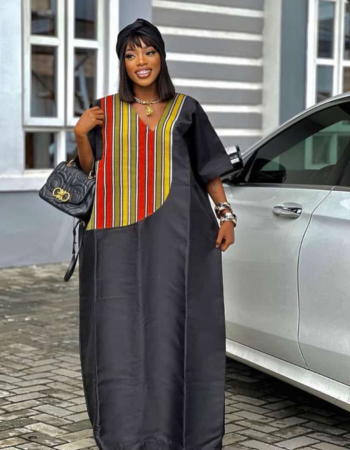Are you ready to dive into the vibrant world of fashion, specifically the bubu styles in Nigeria? Well, put on your fashion-forward hats because we’re about to embark on a thrilling journey through the intriguing realm of Nigerian fashion. The “BUBU STYLES IN NIGERIA” are more than just clothing; they are a cultural statement, a manifestation of individuality, and a testament to the artistic prowess of Nigerian designers. So, grab your fashion compass and let’s navigate this exciting terrain together.


What Exactly Are BUBU Styles?
First things first, you might be wondering, “What are BUBU styles in Nigeria?” Well, buckle up because we’re diving right in! BUBU styles, short for “Boubou,” are a traditional Nigerian attire characterized by their loose, flowing silhouette. These garments are often ankle-length and come in various designs, colors, and fabrics, making them incredibly versatile. They are unisex and can be worn by both men and women, adding to their appeal.
A Rich History
BUBU styles have a rich history that dates back to the Hausa and Fulani cultures in Northern Nigeria. Originally, they were associated with the Muslim communities and were worn for religious and cultural occasions. However, over the years, these styles have transcended their cultural boundaries and become a part of mainstream Nigerian fashion.
A Versatile Wardrobe Staple
One of the most remarkable aspects of BUBU styles is their versatility. They can be tailored for both casual and formal occasions, making them a staple in many Nigerian wardrobes. Whether you’re heading to a traditional wedding or a laid-back social gathering, a well-crafted BUBU outfit will always ensure you stand out.
A Canvas for Creativity
Nigerian designers have taken BUBU styles to a whole new level of creativity. The traditional silhouette has become a canvas for designers to experiment with various fabrics, embellishments, and details. From handwoven textiles to intricate embroidery, BUBU styles showcase the extraordinary craftsmanship of Nigerian designers.






BUBU Styles: A Palette of Cultural Diversity
Nigeria is a diverse nation with over 250 ethnic groups, each with its own unique cultural identity. BUBU styles have become a canvas to celebrate and showcase this cultural diversity.
Yoruba BUBU Styles
In Yoruba culture, BUBU styles are known as “Agbada.” These styles are often adorned with intricate embroidery and are characterized by their wide sleeves. Yoruba BUBU styles are a symbol of elegance and are commonly worn during special occasions and ceremonies.
Hausa-Fulani BUBU Styles
The Hausa-Fulani BUBU styles have a distinct look. They are often made with rich, colorful fabrics and feature bold patterns. These styles are a reflection of the vibrant culture of the Hausa and Fulani people and are commonly worn during festivals and weddings.
Igbo BUBU Styles
Igbo BUBU styles, also known as “Isiagu,” are known for their unique patterned design. These styles are a blend of tradition and modernity, making them popular for various events, from traditional ceremonies to casual outings.
Cross-Cultural Fusion
In a testament to Nigeria’s unity in diversity, BUBU styles have become a symbol of cross-cultural fusion. Nigerians from different ethnic backgrounds often incorporate elements from other cultures into their BUBU outfits, creating a harmonious blend of styles.
A Fashion Statement with a Cause
BUBU styles are more than just clothing; they represent a sense of pride and unity. Many designers and fashion enthusiasts use BUBU styles to promote social causes and make a statement.
Empowering Women
BUBU styles are often designed to empower women. These outfits celebrate femininity, allowing women to feel confident and beautiful. Many Nigerian women find strength in wearing BUBU styles, breaking barriers and challenging traditional gender norms.
Promoting Indigenous Fabrics
BUBU styles have provided a platform for indigenous Nigerian fabrics like Ankara and Aso-oke to gain recognition. The use of these fabrics in BUBU styles has revitalized local textile industries and created job opportunities for weavers and artisans.
Supporting Local Artisans
The creation of BUBU styles involves a network of skilled artisans, including tailors, weavers, and embroiderers. By promoting and wearing BUBU styles, individuals contribute to the growth of these local businesses, fostering economic sustainability.











